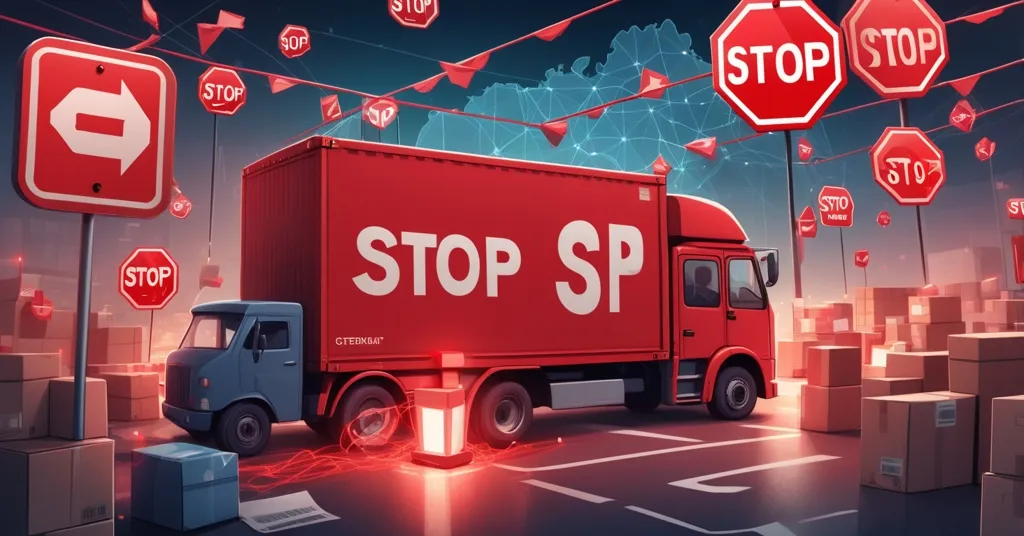European Postal Halt to U.S. Over De Minimis End: Can Blockchain Solve Trade Chaos?

European Postal Carriers Halt U.S. Shipments as De Minimis Exemption Ends: Could Blockchain Be the Fix?
Nine European countries have slammed the brakes on shipments to the United States, leaving small businesses and consumers in a bind as a century-old customs rule—the de minimis exemption—gets scrapped by a Trump-era executive order. Effective August 29, 2025, this policy shift is wreaking havoc on international trade, with major postal carriers like DHL and La Poste caught in a logistics nightmare that might just beg for a decentralized solution.
- De Minimis Axed: U.S. ends duty-free entry for packages under $800, starting August 29, 2025.
- Europe Impacted: Germany, Spain, France, and six others suspend U.S.-bound deliveries.
- Crypto Angle: Blockchain could offer a way out of this centralized trade mess.
De Minimis Demise: What Changed?
For over 100 years, the de minimis exemption let packages valued under $800 enter the U.S. without customs duties or much paperwork—a border fee loophole that made small-scale international trade a breeze. Between 2015 and 2024, these shipments skyrocketed from 134 million to over 1.36 billion annually, with U.S. Customs and Border Protection (CBP) processing a mind-boggling 4 million packages daily. It was a lifeline for European mom-and-pop shops sending goods directly to American buyers, keeping costs low and competition alive. But former President Donald Trump pulled the plug with an executive order, citing national security, economic protection, and health risks. Data from FY24 shows 90% of cargo seizures, including 98% of narcotics cases, tied to these low-value packages. As of this Friday, every parcel faces new taxes and red tape, and the fallout is ugly.
Postal Paralysis: Europe Hits Pause
Postal services in Germany, Spain, France, Belgium, Sweden, Denmark, Finland, Norway, and Switzerland have frozen U.S.-bound shipments. Big names like DHL (through Deutsche Post and DHL Parcel Germany), Correos in Spain, La Poste in France, and Posti in Finland started halting deliveries as early as last Saturday, with others following by Monday. What started as a stop on packages under $800 has snowballed—Finland’s Posti won’t even ship letters or gifts now because airlines are flat-out refusing to transport any postal items to the U.S. If you’re waiting on that quirky $50 scarf from France, tough luck. Meanwhile, corporate titans shipping in bulk and paying tariffs are sipping champagne, untouched by this peasant problem. For more on these suspensions, check out the latest reports on European postal halts.
“Key questions remain unresolved, particularly regarding how and by whom customs duties will be collected in the future, what additional data will be required, and how the data transmission to the U.S. Customs and Border Protection will be carried out,” DHL stated, capturing the industry-wide confusion.
For those new to trade lingo, customs duties are taxes on imported items based on what they’re worth, what they are, and where they’re from—think of them as a border toll. The old rule let small packages slide through without this hassle. Now, every item needs detailed paperwork and a fee, but nobody has a damn clue who’s collecting it or how. European postal systems, often running on tech older than a 90s flip phone, can’t handle the detailed information—like exact contents and sender specifics—that CBP demands. Spain’s Correos didn’t hold back on the chaos this creates, as echoed in DHL’s updates on U.S. customs policy changes.
“This situation forces Correos, along with all postal operators that manage shipments destined for the United States, to substantially modify their processes and increase shipment controls to implement the new customs requirements, significantly impacting international postal logistics and e-commerce flows,” Correos noted.
Airline Ghosting: Even Letters Are Grounded
As if outdated tech wasn’t enough, airlines are making things worse by refusing to fly postal items to the U.S. Apparently, even your grandma’s birthday card is now a national security threat. Finland’s Posti dropped the bombshell that several carriers have washed their hands of the whole mess, halting transport of any mail, gifts included. Community reactions to these halts can be found in Reddit discussions on European postal suspensions.
“Several airlines have now refused to transport any postal items to the United States,” Posti confirmed.
This isn’t just a hiccup; it’s a full-blown crisis exposing how fragile centralized logistics are when hit with sudden policy shifts. And while personal exemptions for travelers (up to $200) and gifts (up to $100) remain intact, that’s cold comfort for businesses watching their supply chains collapse.
The Human Cost: Small Biz and Buyers Suffer
The timing couldn’t be worse for small European exporters already battling a brutal global economy. Unlike corporate giants with fancy logistics teams, these folks relied on de minimis to keep prices competitive. Picture a Swedish artisan selling a $60 custom game controller to a U.S. buyer—now it’s stuck at the border, slapped with a $10 duty nobody knows how to pay, and the seller’s out of business by Christmas. American consumers are equally screwed, facing higher prices or simply unavailable goods. We’ve seen this before; when China lost its de minimis exemption in May, platforms like Temu and Shein suffered price spikes and slumping demand. Europe’s now in the same boat, and “temporary” suspensions have no end in sight. For deeper insights, explore the impact on European small exporters and e-commerce.
Centralized Collapse: Why Systems Fail
Let’s zoom out. The U.S. government isn’t just chasing tariffs—it’s framing this as a national emergency. Beyond lost revenue (309 million de minimis shipments in FY25 through June alone), there’s a darker side: smuggling. Fentanyl, counterfeit goods, and weapons parts have slipped through under de minimis, with CBP flagging 77% of prohibited item seizures tied to these packages. It’s a solid argument for tighter control, but the rollout? A complete dumpster fire. Sure, security matters, but when you throttle 309 million shipments for a fraction of bad apples, the cure might be worse than the disease. Centralized overreach often punishes the little guy hardest, and this fiasco shows just how creaky fiat-driven systems are under pressure. Curious about broader trade implications? Check out this discussion on the end of de minimis and international trade.
There’s also a geopolitical sting. This isn’t just a trade spat; it’s a stress test for U.S.-Europe relations. Europe’s frustration isn’t purely economic—it’s personal. If trust erodes, trade wars could heat up, and the U.S. risks alienating allies when it needs them most. Centralized policies often burn bridges that decentralization might rebuild, which brings us to a potential game-changer.
Decentralized Dawn: Can Crypto Save the Day?
For the HODLers among us, this mess is another neon sign: centralized systems crumble when stressed. Bitcoin’s resilience isn’t just financial; it’s philosophical. If Bitcoin can bypass banks, why not border bureaucrats? Blockchain could be the dark horse here, offering a tamper-proof, borderless way to handle customs data. Imagine a system where detailed package info is logged on a public ledger, accessible to CBP without clunky middlemen. Smart contracts—Ethereum’s unsung hero—could automate duty calculations and payments, triggered instantly via stablecoins or even Bitcoin micropayments for tiny fees. Projects like IBM’s TradeLens have already toyed with blockchain solutions for customs and trade logistics; scaling that for postal logistics isn’t sci-fi, it’s plausible.
I’m not peddling utopias—Bitcoin maximalists like me know the king stays pure for store-of-value, not every niche. But altcoin innovations, especially Ethereum’s programmable contracts, might fill gaps Bitcoin shouldn’t. Plus, for those cheering effective accelerationism, this disaster isn’t a bug; it’s a feature. If chaos forces us to rethink trade with decentralized tools, let’s not just adapt—let’s accelerate. Centralized logistics choking on red tape is the perfect ad for why we need Bitcoin’s ethos of freedom and disruption in every damn corner of global systems.
That said, reality bites. Small exporters are bleeding, consumers are pissed, and carriers are passing the buck. The U.S. wants secure borders—fair enough—but rolling this out without a lifeline for allies is a geopolitical gut punch. If the goal was protecting American interests, someone forgot the collateral damage. Could this be the push to ditch creaky fiat frameworks for Bitcoin-powered trade rails? We’re watching closely. For ongoing community updates, see the latest Reddit threads on DHL and other carrier suspensions.
Key Takeaways and Burning Questions
- What is the de minimis exemption, and why does its end disrupt trade?
It’s a century-old U.S. rule allowing packages under $800 to enter duty-free with little paperwork. Its termination on August 29, 2025, adds taxes and red tape, stalling small-scale trade between Europe and the U.S. - Why are European postal carriers like DHL halting shipments to the U.S.?
New U.S. customs rules demand detailed data and unclear duty payments that outdated postal systems can’t handle. Airlines refusing to transport goods—even letters—pile on the chaos. - Who’s bearing the brunt of this international shipping crisis?
Small European businesses and U.S. consumers relying on affordable, direct purchases are suffering most, while bulk-shipping corporations remain unscathed. - How could blockchain and crypto tech address this trade logistics mess?
Blockchain offers transparent, borderless data sharing for customs, while smart contracts on platforms like Ethereum could automate duty payments. Bitcoin micropayments might even fund fees seamlessly. - What’s the timeline for resuming U.S.-Europe shipments, and what’s the holdup?
No clear timeline exists. Outdated tech, unresolved duty collection processes, and airline bans are major roadblocks, exposing flaws in centralized trade systems. - Why does this matter for Bitcoin and decentralization advocates?
This crisis screams fragility in centralized logistics and fiat inefficiencies. It’s a rallying cry for Bitcoin maximalists and decentralization fans to push disruptive, resilient solutions.
Let’s not sugarcoat this: it’s a clusterfuck of epic proportions, born from a policy that sounds righteous on paper but ignores the real-world carnage. While I’m all for smashing broken systems—and Bitcoin’s ethos thrives on exposing fiat flaws—this isn’t progress; it’s just pain for the little guy. We’ll keep tracking this unfolding disaster, hunting for silver linings in the rubble. If decentralized tech can ride to the rescue, we’re here to champion it. Stick with us as we push for a future where chaos births acceleration, not collapse.



